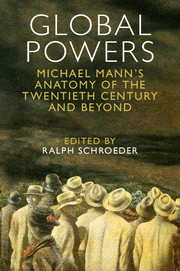Book contents
- Frontmatter
- Contents
- List of contributors
- 1 Introduction
- Part I Theory and history
- Part II Political, economic, military and ideological questions
- 5 On political decency
- 6 Mann on neoliberalism
- 7 Nationalism and military power in the twentieth century and beyond
- 8 History, historical sociology and the problem of ideology: the cases of communism and neoliberalism
- 9 Mann's globalizations and their limits
- Part III American exceptionalism
- Part IV Empire
- Part V Response
- Index
- References
8 - History, historical sociology and the problem of ideology: the cases of communism and neoliberalism
from Part II - Political, economic, military and ideological questions
Published online by Cambridge University Press: 05 April 2016
- Frontmatter
- Contents
- List of contributors
- 1 Introduction
- Part I Theory and history
- Part II Political, economic, military and ideological questions
- 5 On political decency
- 6 Mann on neoliberalism
- 7 Nationalism and military power in the twentieth century and beyond
- 8 History, historical sociology and the problem of ideology: the cases of communism and neoliberalism
- 9 Mann's globalizations and their limits
- Part III American exceptionalism
- Part IV Empire
- Part V Response
- Index
- References
Summary
The final volumes of Sources of Social Power have appeared at an interesting time in the development of academic history. Over the past decade, several historians have become dissatisfied with what they see as the excesses of the ‘cultural turn’ which has dominated the field since the 1980s, bemoaning two effects in particular: first, the neglect of the socio-economic and, more generally, the structural; and second, the abandonment of ‘macro-history’ and the big picture. Indeed, both are related, as a historian who adopts an ‘interpretive’ approach, primarily concerned with recovering the ways in which historical actors interpreted their world, is likely to be more interested in context than in identifying the main forces that affect societies and tracing broad patterns of development over time. Historical sociologists have also been wary of the grand syntheses fashionable in the 1970s and 1980s, though professional specialization may have had more impact than the cultural turn. Even so, the British sociologist Dennis Smith has argued that works like Mann's and Wallerstein's are no longer common in historical sociology because the intellectual scene is ‘awash with talk of individualism, identity, the self and social fluidity … [which have] turned the world into one giant swimming pool’ (Smith 2014: 207).
Historians have responded to these critiques of the cultural turn in various ways. One is to reject it completely; but, rather than returning to older social structural approaches (which are still unfashionable), they focus on subjects such as trading networks, migration and international institutions, as with the newly fashionable ‘global history’ (or a ‘big history’ popular outside the academy) which often, though not always, has less interest in the social (Bell 2013; Christian 2004; Morris 2010; though, for exceptions, see, among others Davis 2011; Hunt 2014). Other historians, however, have sought to combine the cultural and the socio-structural. Two of the most stimulating recent books on the state of the field in the United States and Europe by William Sewell and Geoff Eley agree that historians have overemphasized context at the expense of structure and have therefore tended to produce highly nuanced, but excessively narrow micro-historical studies. They also accept that the achievements of cultural history have to be defended and that we cannot return to the excessively structuralist social history of the 1950s and 1960s.
- Type
- Chapter
- Information
- Global PowersMichael Mann's Anatomy of the Twentieth Century and Beyond, pp. 143 - 163Publisher: Cambridge University PressPrint publication year: 2016
References
- 1
- Cited by



